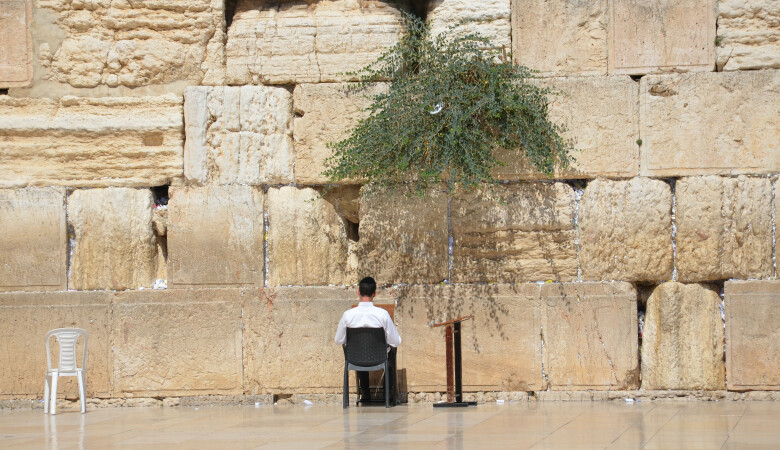Series: Mark
Exposing Vain Worship, Espousing Heart Worship (Mark Sermon 30)
November 06, 2022 | Andy Davis
Mark 7:1-13
Legalism, Worship
Pastor Andy Davis preached on Mark 7:1-13 exploring the genuine purpose of worship and its three enemies: legalism, traditionalism, and hypocrisy.
- SERMON TRANSCRIPT -
Turn in your Bibles this morning as we continue our study in the gospel of Mark. We're in chapter 7 now looking at verses 1-13, exposing vain worship and espousing heart worship. One of the greatest issues of the human soul stands in front of us this morning in this text, and that is of genuine worship. Worship from a pure heart, worship that engulfs your soul, worship that is a fragrant offering to your Creator, your God, the lover of your soul—true heartfelt worship. That's what's in front of us here. It's not difficult to make the case that establishing that worship in human hearts is the entire purpose of scripture, of the gospel, of the work of God, and in the original creation and the work of Christ in redemption, the work of the Holy Spirit and regeneration that we human beings created in the image of God, would genuinely worship God from our hearts for all eternity. That's it. And against this precious thing, are three of its greatest enemies, legalism, traditionalism and hypocrisy. Legalism, the belief that God accepts our worship based on how well we keep a set of rules and regulations. In that case, our focus is on ourself and our own performance. Traditionalism, the belief that true worship of God consists in manmade patterns, crafted by human beings generations ago and handed down unchanged from generation to generation. Keeping that tradition, that's the essence of worship. Then there's hypocrisy, putting on a show, a show for God and others when our hearts are actually far from God. The whole thing is false. It's a lie. Hypocrisy. These are the issues in front of us in Mark 7:1-13.
"It's not difficult to make the case that establishing that worship in human hearts is the entire purpose of scripture, of the gospel, of the work of God, … And against this precious thing, are three of its greatest enemies, legalism, traditionalism and hypocrisy."
Now the setting in Mark's gospel - Jesus has just fed the 5,000 plus women in children. He's walked on water, and then we get a quick summary at the end of chapter 6 of a healing ministry that's comprehensive and mind boggling. But it's just a summary of perhaps as many as thousands of miracles that were done. Miracles mostly of healings, even of people that just touched the hem of his garment who were instantly healed by his power. Jesus, at this moment, it could be argued is at the pinnacle of his temporary popularity. The crowds are swelling with anticipation. In John 6, after the feeding of the 5,000 some of them want to take Him by force and make Him king. They don't really understand who He is or what His kingdom is, but they want to do that.
Jesus is a threat to the religious establishment, and a delegation of religious police is sent. Self-appointed investigators, scribes and Pharisees come to observe Jesus and not friendly at all, but to try to find fault with him and shut him down if they can. We see right away in this outline, the legalist charge against Jesus, ceremonial defilement. Look at verses 1-5. The Pharisees and some of the scribes who had come from Jerusalem, gathered around Jesus and saw some of his disciples eating food with hands that were unclean, that is "unwashed!" Mark gives his Gentile audience, probably Romans who didn't understand these things, this explanation. The Pharisees and all the Jews do not eat unless they give their hands a ceremonial washing, holding to the tradition of the elders.When they come from the marketplace, they do not eat unless they wash and they observe many other traditions such as the washing of "cups, pitchers, kettles”.
So the Pharisees and Scribes ask Jesus, "Why don't your disciples live according to the tradition of the elders instead of eating their food with unclean hands"? They're making a charge against Jesus by means of his disciples breaking tradition through this ceremonial defilement. Who are these Scribes and Pharisees? These were professional legalists. This is a great escalation of conflict with the Jewish authorities. As I said, a delegation is sent from Jerusalem to check Jesus's rising influence and find fault with him if they can to try and find a way to put a stop to Jesus.
The Pharisees were a religious party, a group of religious leaders, who had maneuvered their way in Jewish society to the top pinnacle of esteem in terms of their spirituality in their religion. They made the meticulous study of the Law of Moses their top priority and then dispensing rulings and judgements based on that. The Scribes were priests from the temple area whose day-to-day work was that of copying the Law of Moses letter by letter. There weren't printing presses back then, it was all done by hand, and these Scribes were entrusted with the task. But beyond that, they were teachers of the laws that they read and they taught their interpretation of scripture to the people. So Scribes and Pharisees are the religious leaders of the Jewish nation. Both of them are legalists who think that their right standing with God is based on how well they keep the laws of God. They generally thought they kept them just fine. “All these commands I have kept from my youth.” They would say something like that. Furthermore, they accepted the trappings of honor in Jewish society, whether at banquets or in the marketplace or other places. They love that kind of thing. They love to be honored and to have the most important seats of the banquets. That's who they were.
What is the origin of their religious legalism? Where did all that come from? We could start with the exile to Babylon. In the exile, the remnant that was exiled was made aware, very plainly, by the ministry of Ezekiel and Jeremiah that it is because they have violated the laws of God for generations that this exile has come. They have broken God's laws and have gone over into idolatry and wickedness. And for this reason, most of them were killed by sword, famine, and plague. A small remnant was exiled to Babylon. Daniel, a godly man, is very aware of this and prays in Daniel 9:11, this prayer, "All Israel has transgressed your law and turned away refusing to obey you. Therefore, the curses and sworn judgments written in the Law of Moses, the servant of God, have been poured out on us, because we have sinned against you". Well, they got it. They got the message. At least Daniel did. And godly exiled Jews like him, understood.
When in the course of time under the rule of Cyrus the Great of Persia, a small remnant, 42,000 was allowed to come back and repopulate the Promised Land, Jerusalem. They were committed to the law of God. Even if within a short amount of time there were some of them that intermarried. Ezra and Nehemiah pulled out their hair and were zealous that they would not fall into the same patterns of wickedness that their ancestors had fallen into. Ezra 7:10, it says, "Ezra had devoted himself to the study and observance of the Law of the Lord and to teaching its decrees in laws in Israel". That all sounds good, right? Ezra was a godly man studying God's Word.
But in the course of time, patterns of legalism and traditionalism emerged that were very corrupt based on this initial zeal. Schools of religious lawyers developed who spent their full time debating this or that law, trying to nail down exactly what they're supposed to do in every case in life. Scribes and Pharisees were in that heritage. They arose and studied the law more carefully than anyone else and appointed themselves ethical police over to the daily life actions of others. That's a simple answer to the origin of their legalism.
Let's go broader and deeper. There's a deeper answer to the origin of legalism. It's just in the wicked, sinful heart of man. We, sinners, want to fix our problems ourselves. We want to save ourselves. Most of us aren't denying there's a problem. Vertically with God, horizontally with others, but we want to solve it. We want to make up our own religion that'll solve it. We want to follow our own rules. We want to be the master of our own fate and the captain of our own souls. Spiritually, we want to save ourselves, and this is true all over the world. Every religion except Christianity is codified self -salvation. Self -salvation, that's what we want to do. Look at Mark 7:7, "They worship me in vain. Their teachings are but rules taught by men". It's a manmade religion. That's the origin of legalism. That's where it's coming from.
For Scribes and Pharisees, their highest value is conformity to legal tradition. By the time of Jesus there are well developed schools of rabbis who spent their full time discussing and teaching minutia of the law. A key issue here is that the law of God itself was deemed too complicated for average ordinary people to understand. There's clear evidence of this that these elitists considered the common group of people to be an untrained rebel who could not just read and hear God's law, and get it right. So they needed the Scribes and Pharisees to interpret it. They began to give additional insights, rules and regulations that were beyond the scripture. And so it went, rabbi so and so commenting on rabbi such and such who made observations saying this and that and therefore the other. And it was all written down, this heritage of rabbi this and rabbi that and all this kind of thing.
These verbal traditions were erected like a safety fence around the law of God, keeping a safe zone around God's law with the idea being if you keep the tradition of the elders, you're certain to be acceptable to God because we're going beyond what God requires and therefore He must accept you if you just follow our traditions. In the second century AD, the second century after Christ, a Rabbi Yehuda organized the rabbinic teachings that have been passed on into a book called the Mishnah. In time there arose more and more traditions and disputations and statements based on the Mishnah itself, course. Those additional disputations and wranglings over the Mishnah were organized into another book called the Gemara. The Mishnah plus the Gemara together is called the Talmud. Twelve centuries of Jewish rabbis wrangling over originally the Word of God, but mostly over their own traditions. That's the Talmud and it's the authority for most Jews in the world that are religious. They are Talmudic scholars. Now, do you not see behind all of this an astonishingly disparaging attitude toward the Word of God?
I. Legalists’ Charge Against Jesus: Ceremonial Defilement
What we see in Mark 7 in Jesus' accusation against them came true concerning the Talmud. The Talmud came to be put above the Word of God, far above it. The traditions of men totally supplanted the laws of God. Listen to these statements from the Talmud itself. "The sacred scriptures is like water. The Mishnah is like wine, but the Gemara is aromatic wine". That's a clear hierarchy. The lowest level is the Word of God. What you want to get up is to that beautiful level of the Gemara, or again, "My son give heed to the words of the Scribes rather than to the words of the law". And again, this one, "He who transgresses the words of the Scribes sins more gravely than the transgressors of the words of the law". That's from the Talmud. It's astonishing that the opinions of human beings can take the place of the perfect Word of God. The accusation by the Pharisees and Scribes of Christ is ceremonial defilement. They stood around Jesus and watched him and his disciples eating their meal and they accused him. That’s creepy. They're just standing watching them eat. Verse 5, "Why don't your disciples live according to the tradition of the elders instead of eating their food with unclean hands"? Mark, as we said, gives us this detailed backstory about these comprehensive traditions. Let's read again, verse 3-4, “The Pharisees and all the Jews. . .”, see that? Everybody's doing this stuff. The Pharisees have won the day. Everybody's following this. The Pharisees and all the Jews do not eat unless they give their hands a ceremonial washing, holding to the tradition of the elders. When they come from the marketplace, they do not eat unless they wash, and they observe many other traditions such as the wash and cups, pitchers, kettles, et cetera.
This is an elaborate, carefully developed system of ritual washings that covered almost every area of life mandated by the elders in their traditions. Notice clearly their accusation is not that Jesus and his disciples are violating the law of God. They're not even thinking about that because it's not stated anywhere in the Law of Moses. You're not going to find it. There are not these washings laid out in the Law of Moses. This is all human tradition. Now don't misunderstand. This has nothing to do with germs. It's not like if only they had that hand cleanser stuff that kills 99.99% of all the germs. If they had that, we wouldn't have this problem. It has nothing to do with germ theory, which didn't come until Louis Pasteur and all that. That's not what we're dealing with here. Not at all. This is about religion. If you don't wash like this, you're not acceptable vertically to God. That's their charge.
II. Jesus’ Charge Against Legalists: Arrogance over God’s Word
What's Jesus' charge against the legalists? Now it goes back. Arrogance over God's Word. Let's reverse the order that Jesus takes. Let's not walk through it in the order in the text. Let's go later and then work back. Let's address their arrogance over God's Word and then get to the deeper issue of worship. First, their arrogance concerning God's Word. Verse 7, "Their teachings are but rules taught by men, manmade rules concocted from the imaginations and morals and thoughts of men without the Holy Spirit”. Verse 9, "And he said to them, you have a fine way of setting aside the commands of God in order to observe your own traditions". In other words, you make a regular habit of doing this. You are continually doing this. You're setting aside God's Word to observe your own manmade traditions. This is a habit you have. I believe Jesus is being sarcastic here. The Greek word kalos is, "Well, you're really good at this. You're fine at this. You have developed this skill to a high level. There's a level of sarcasm here you're really good at. You do this well. You're experts at this evil thing of setting aside God's Word to favor your traditions.”
Then Jesus gives a case study, a clear example. Look at verses 10-13, "For Moses said, ‘Honor your father and mother and anyone who curses his father or mother must be put to death’. But you say that if a man says to his father or mother, ‘Whatever help you might otherwise have received from me is corban,’ that is a gift devoted to God, then you no longer let him do anything for his father or mother. Thus, you nullify the Word of God by your tradition that you have handed down.”
Then He expands it in verse 13, the very end of the phrase of today's reading, "And you do many things like that". In other words, this is just one case. You do this all the time. This is a serious attack on the Word of God. Notice how Jesus clearly contrasts tradition with God's Word. Matthew's account makes it even sharper. Matthew 15:5, "For God said, honor your father and mother and anyone who curses his father and mother must be put to death". But you say . . ..” I mean, that's about as clear as it gets, “ for God said, but you say.”That's the whole system that we're dealing with here. The whole system of legalism and traditionalism was a serious attack in the Word of God. Legalism is fundamentally adding to and subtracting from the Word of God because you think there's something wrong with it. They added requirements that God did not give and thereby they overturned the requirements that God did give. What is this case study about the practice of corban? It has to do with the habit or the practice of corban, a gift devoted to God. Sometime before Jesus, generation before, the rabbis decided that if any Jewish man, let's say had a sum of money or a possession or even all of his money or all of his possessions, and he put somewhat of a fence around it and called it corban, he still owns it, it’s still his, but he designates it a gift devoted to God. Then it's off limits for anything else, including using it to help aging parents in their old age, caring for them financially. This concept became a nasty loophole through which people drove huge ox carts.It is nowhere found in scripture, but just something they made up.
The fundamental issue here when it comes to the Word of God is the sufficiency and the clarity of scripture. The legalist is adding new laws because he feels God's laws are insufficient to get the job done for a good life on earth. “We need some additional help here. God missed some things and furthermore , it’s not clear. So you need us, the expert teachers, to explain stuff to you. You'll never get it because you're an unwashed rebel. You need us.” It's impugning the clarity of God's Word. Either way, do you not see the breathtaking arrogance towards scripture, toward the Word of God? This is exactly why God condemned this very practice before it ever came. Many times in Deuteronomy 4:2, "Do not add to what I command to you and do not subtract from it, but keep the commands of the Lord your God, that I give you". That couldn't be clearer. Don't do this thing. Don't add to, don't subtract from.
By the way, what does that imply God saying about his Word? It's perfect. You can't make it better by adding or subtracting. Again, Proverbs 35 and 36, it says, "Every word of God is flawless. Do not add to his words or he will rebuke you as a liar". That couldn't be clearer. The whole Bible ends with a warning to not add to or take away from anything in the Book of Revelation, and by extension the whole 66 books of the Bible. Don't add to it. Don't take away from it. Christ in this case study perfectly upholds the law of God as it is written.
The example Christ cites is the fifth command of the 10 commandments. 10 commandments came down from on high, came down from the mouth of God, written by the finger of God when God descended in fire on Mount Sinai, and he gave the 10 commandments to the Jewish nation. They come in two tables, a vertical table, the first four commandments, love the Lord your God with all your heart, soul, mind and strength sums it up vertically. Then you got horizontally. Love your neighbors as yourself. The first of the horizontal table, other people, is honor your father and mother. The concept here is a child born into a family must learn to submit gladly to parental authority. Honoring is something you do in your heart. And out of that heart flow is a pattern of obedience, a pattern of delighted obedience from child to parent that is foundational to all the other horizontal relationships they'll live in the rest of their lives. They've got to learn this from the start. The two commandments specifically to children are honor and obey. Honor your father and mother, treat them with respect in your heart, and then obey [Ephesian 6:4]. That's it.
Now honoring, it goes far beyond lip service and all that. It's just a state of heart. It's giving esteem a high place in your mind and heart to your parents. Christ upholds the authority of parents over their children, and He even goes so far as to cite the death penalty concerning parents. He said, "Anyone who curses his father or mother must be put to death”[ Exodus 21:17]. When new parents bring home a little child, an infant from the hospital, being instruments of God that they will at the right time, understand this commandment and live it out, that's central to parenting. It's not because you're so great, I'm a parent, you're not so great. But it's because they need to understand God is behind this and saying it to them and they must. There's so much disrespect from child to parent and God doesn't coddle it at all. Jesus says it's worthy of death. Thanks be to God that Jesus died on the cross to take away the death penalty for us sinners.This is a serious matter. So Christ is extremely distressed with the Scribes and Pharisees, their arrogant handling of the perfect Word of God.
III. Jesus’ Deeper Charge: Hypocrisy in Worship
But let's get to the deeper charge. The deeper charge is hypocrisy in worship. You have to go back in the text for that. Look at verse 6-7, "Isaiah was right when he prophesied about you hypocrites, as it is written, these people honor me with their lips, but their hearts are far from me. They worship me in vain. Their teachings are but rules taught by men” [ Isaiah 29:13]. These people honor me with their lips, but their hearts are far from me. Isaiah in his day, exposed a problem among his own countrymen that's still with us today, hypocrisy in worship. Seven centuries before Jesus was born, Isaiah begins his prophecy with an expose on the Jewish hypocrisy and formalism in their religious machinery. It was running like a machine, talking about the animal sacrificial system and the temple and the cycle of three festivals and daily animal sacrifice. It was a big machine going on in Isaiah's day and in Isaiah 1:11-14, this is what God says about it, "The multitude of your sacrifices, what are they me, says the Lord. I have more than enough of burn offerings of rams and of the fat of fated animals. I have no pleasure in the blood of bulls and lambs and goats. When you come to appear before me who has asked this of you, this trampling of my courts. Stop bringing meaningless offerings. Your incense is detestable to me. New Moons, Sabbaths and convocations, I cannot bear your evil assemblies. Your New Moon festivals and your appointed feast my soul hates. They become a burden to me. I'm weary of bearing them”. And yet they're all commanded in the Law of Moses to be done. What's the problem? Hypocrisy. They don't feel it in their hearts. It's just a machine that's running week after week, year after year, as in Isaiah's day, so in Christ's day with the Scribes and Pharisees and may I say, as in Christ's day, so in our day. We're a very religious country. We drive by so many churches to get to this church. Many of them are filled with people, very religious. But here's the question, is it possible that the scathing critique Jesus gave, "These people honor me with their lips, but their hearts are far from me. They worship me in vain" is true of us today.
So what is this issue of hypocrisy? What is hypocrisy? A hypocrite is a person who acts righteous when they're not, let's say, or a person who says one thing and does another. They don't practice what they preach. Claiming to have moral standards to which they don't actually conform. The word “hypocrite” is literally a Greek word brought straight over pretty much letter for letter into the English. It means “an actor”. The Greek word meant an actor. You remember the symbol of dramatic arts? You have the two masks, the smiley mask and the sad mask. That symbol, those masks were things that those Greek actors would hold in front of their faces, happy or sad, that kind of thing. They're actors in a drama. They play this role, but they don't feel any of it. It's just a show which they do for the audience.
Now in our culture, we give a very high place to actors and actresses. We ask their opinions on the economy. It's incredible, these people, we can well applaud their talents and skills at acting. It's really quite remarkable. You can watch the same individual in multiple movies and the same person is playing a, I don't know, a homeless street person in one movie and a Nobel Prize winning physicist in another and a president in another, and then a captain of a sailing vessel in another. You may say,”Wow, how do they do it"? Their range as actors is incredible. I've often wondered what it would be like to be married to a really skillful actor. I mean, in real life. You see all their movies and all the same faces that they're giving you when they're expressing love or whatever they've given to other people in a movie. Would you ever be secure in that relationship? I mean, do you really love me or is this just like that scene in that movie back then? I don't know what you're doing. Maybe that's why so many of those marriages don't last very long. Is any of it real? The Scribes and Pharisees played at being righteous. They played at it, but their hearts were far from God. God was never their audience. Jesus said it plainly. Matthew 23, "Everything they do is done for others to see". He said in Matthew 23, "You are like whitewashed tombs, which look beautiful on the outside, but inside they're full of dead men's bones and everything unclean. In the same way, on the outside you appear to people as righteous, but inside you're full of hypocrisy and wickedness”.
What is hypocrisy in worship? It's acting reverent when you're not. So what is it? What is true worship? What are we talking about? Is it not a heart aflame with the glory of God? A mind captivated by God's nature, captivated by God's great actions and history? God's nature, his power, his compassion, his tenderness, his mercies, his holiness, his righteousness? And all of his great achievements in creation and in the Exodus and the history of Israel and then especially in Jesus, his life, his death, his resurrection? Is this not true worship? But a hypocrite doesn't feel any of this. It's not genuine. None of that moves the needle really.
"What is true worship? … Is it not a heart aflame with the glory of God? A mind captivated by God's nature, captivated by God's great actions and history?"
Now along with this issue of hypocrisy comes the problem of traditionalism. Look at verse 3, "The Pharisees and all the Jews do not eat unless they give their hands the ceremonial washing, holding to the tradition of the elders". Again, verse 5, "The Pharisees and teachers of the law ask Jesus, ‘Why don't your disciples live according to the tradition of the elders instead of eating their food with unclean hands?’” And then again, verse 7, "They worship me in vain, their teaching are but rules taught by men". Three different times it's tradition, tradition, tradition. Traditionalism. What is traditionalism? How is it different than traditions? Are they related? Traditionalism I believe, is elevating a past pattern to a level of religious permanence equal to or even superior to the Word of God. That's traditionalism. It's belief in the traditions, and that they can never be changed. I think somewhat, it's like trying to recapture a beautiful spiritual moment for all time by the outward trappings that were around it at the time, like some things happened and that was awesome. And from then on, we'll do those some things like it's a scientific experiment and then you'll get the spiritual moment that way.
I remember hearing a story of a one local church that decades and decades ago had an amazing Sunday. The word of God was preached powerfully.The spirit of God is poured out in power and a revival broke out in that church. Many people were weeping, falling down, crying out and genuine work happened in their lives. The closing hymn that day was “Spirit of God Descend upon my Heart.” It’s a great hymn. So for the next 50 years, they played that song at the end of every worship service in that church. One day a courageous worship leader changed it and played a different song. It took incredible courage. That's traditionalism. It's like there's this beautiful butterfly and then you capture it in acrylic like a paperweight and just put it down there heavily and it's not going to move. It's not alive. That's traditionalism, imposing that moment as a rule for future generations to follow.
Now, there is an essential place for tradition. Tradition means just that which is handed on. We need a respect for church history. We need a respect for the past. We need to know we are not the first generation of Christians. Lots of stuff was worked out before us and has been passed on and we're not reinventing the wheel every time. We Americans, we love what's hot and cutting edge and trending and all that sort of stuff. Often that's poured over into our worship over the last 25 years. What's hot and trendy is what we’re looking for, and there isn't a respect for a tradition.
IV. True Worship versus Traditionalism
But there's a difference between tradition and traditionalism. Doctrines have been handed down to us from the apostolic era. Paul says very plainly in 1 Corinthians 15:1-4, "What I received, I passed onto you as a first importance that Christ died for our sins according to the scriptures, that he was buried, that he was raised on the third day, according to the scriptures". The word “I passed on” in the Latin is “traditio”. That's where we get the English for “tradition.” It's handed down. There’s nothing wrong with that. There's nothing wrong with a lot of things being handed down, but there are manmade rituals and patterns that get encrusted and then are given equal if not greater authority to the Word of God. Now that's traditionalism and that's what's going on here.
What then is true worship? Three key observations. Number one, it's not manmade, but it's initiated by God. It's revelation and response. God reveals, we respond. Remember Peter's confession of Jesus. "You are the Christ, the Son of the living God". And Jesus said, "Blessed are you, Simon, son of Jonah, for this was not revealed to you by man, but by my father in heaven". Do you hear that? Revealed by God, Peter responds. That's all. Worship is that way. It starts with God, He reveals and then we respond. Secondly, it's not based on human rules and regulations, but based on the Word of God. Where is the record of God's revelation? Only one place, here in the Bible. Our job is to study the scriptures and then worship flows from our understanding of God is revealed in the scripture. That's where it comes from. So it's based on the Word of God. Thirdly, it's not hypocritical, but it's a reflection of a heart that's truly drawn after God. Drawn close to God. Verse 6, "These people honor me with their lips, but their hearts are far from me". True worship is a heart drawn close to God based on the Word of God, and it involves awe, reverence, fear, wonder, amazement, tears, shouts of joy, exaltation, surprise, astonishment. It's a rich array of feelings. But before any of them is truth. Truth first, then the feelings and then the outward actions. That's what true worship is. That's not hypocrisy.
IV. Application
Now, as we close today, I want to just focus on this one statement, this one key issue. Look at verse 6, “These people honor me with their lips, but their hearts are far from me". I want to ask you, is that true of you today or not? "These people honor me with their lips, but their hearts are far from me". Let me turn it around and let's say I hope for a large percentage of you it's not true today.
If it’s not true as you sat here, as you stood here for worship, then you ought to thank God for your salvation. You ought to thank God for the work done in you by the Holy Spirit of God. He worked in you to take out your heart of stone and give you a heart of flesh that is sensitive and responsive to God. No, not perfectly, but you do love him and you do yearn to please him. You can't wait to go to heaven and you're hungry to know more about him. That's who you are. If that's all true of you, praise God. God has saved you through the work of Christ and the cross and by the Holy Spirit.
But let's turn it back. What if it is true? What if it's true that you're honoring God with your lips, with your outward behavior, but your heart is actually far from God? One of two things is true. One is that you may not be a Christian, you’re not born again. Could be that you could say to me, "I'm actually not claiming to be a Christian. I came here today because a friend invited me". The point is your heart, is far from God. That's why Jesus came. He came to seek and to save lost people like you and like I was. He came to go get us and bring us to God. To bring us to God. He came to shed his blood on the cross for all of the many transgressions you've committed while your heart was far from God, to pay for it all in his own blood. And God raised him from the dead to show that that payment was accepted. I'm just crying out to you, and I'm saying don't let it be the case even later today or next week, that your heart is far from God.
Suppose that this is a true statement of you, but you actually are a Christian. It happens to all of us. What's gone on is you become distracted by earthly circumstances. Could be physical pain on your part or a loved one. It could be a financial difficulty. It could be that the worries of this life and the deceitfulness of wealth and the desires for other things is alluring and distracting you and your heart are from God, and maybe even you've been in a habit of playing at your Christianity. The text is standing over you today to plead with you to repent, to acknowledge that you're not loving Jesus with the same love you used to have, that your heart's been drifting from him, and the Lord is standing in front of you now, pleading with you to repent and to come back to God and to live openly and honestly and passionately for him.
Close with me in prayer. Father, we thank you for the time we've had to listen to these words. Thank you for Jesus courage and boldness in telling the truth. Lord, as the psalmist said very plainly in Psalm 1:39, "Search me oh God, and know my heart. Try me and show me if there's any offensive way in me, show it to me and lead me in the way of everlasting". God, we don't want to be hypocrites. We want to be genuine followers of Christ. So please work in us by your redeeming grace. We love you. We praise you. We thank you. In Jesus' name. Amen.































